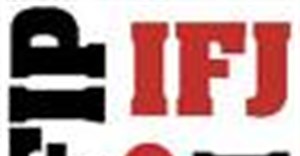Zim journalists should lead efforts for 'fresh start'
The IFJ says the government has indicated its willingness to have a full review of the extensive legal regulations that have been put in place over the past five years. The IFJ and other press freedom groups have strongly condemned the use of such laws to justify media closures and actions against media critics of the government of Robert Mugabe.
"It's time for an alternative strategy that will stop the destructive political manipulation of media and allow journalists to do their work free of corruption and intimidation," said Aidan White, IFJ General Secretary, at the end of a three-day visit to the country in which he met leading journalists, publishers and government officials.
"The media community should prepare a detailed critique of media laws and regulations, how they are misused and what is needed in their place," said White. "This process should have input from all stakeholders including media advocacy groups and should encourage a new approach that will help journalists shake off the dead hand of political influence."
The IFJ says that the country's economic crisis has created a catastrophic situation for journalists. "People are in abject poverty with wages that hardly pay for the bus fare to work," said White. "Inevitably political and financial corruption is damaging journalism at all levels."
He said government and opposition parties had a responsibility to avoid tinkering with existing laws and to create a radical new framework for media based upon international norms of journalism and free expression.
"There needs to be a credible form of self-regulation, a new legal framework that encourages the free flow of information, and a strategy to help media overcome the impact of disastrous economic conditions," he said.
Above all, said White, it is necessary to strengthen media professional groups representing journalists, editors, publishers and broadcasters.
"We need to hear the authentic voice of Zimbabwe journalism speaking out in a new spirit of unity and professionalism," he said.
The IFJ rejected government criticism of international media as being "politically engaged" in covering Zimbabwe, but he said that media inside and outside the country had to guard against either exaggerating or downplaying the country's crisis.
"It's time for all of us to report what is happening accurately and in context," White said." It's what media do best, but they can only do that when they are free from threats and intimidation."
During the visit the IFJ General Secretary met leading journalists, the Zimbabwe Congress of Trade Unions, the Zimbabwe Broadcasting Corporation, the Minister of Information and the State Secretary for Information, the opposition Movement for Democratic Change, the Director of the Voluntary Media Council, as well as the editors of independent newspapers in Harare and the rural areas.
White said the IFJ would seek to develop a working programme of practical support for journalists in the country. The journalism crisis in Zimbabwe will be on the agenda when the IFJ regional group, the Federation of African Journalists meets in Nairobi in November.
Article published courtesy of IFEX.







